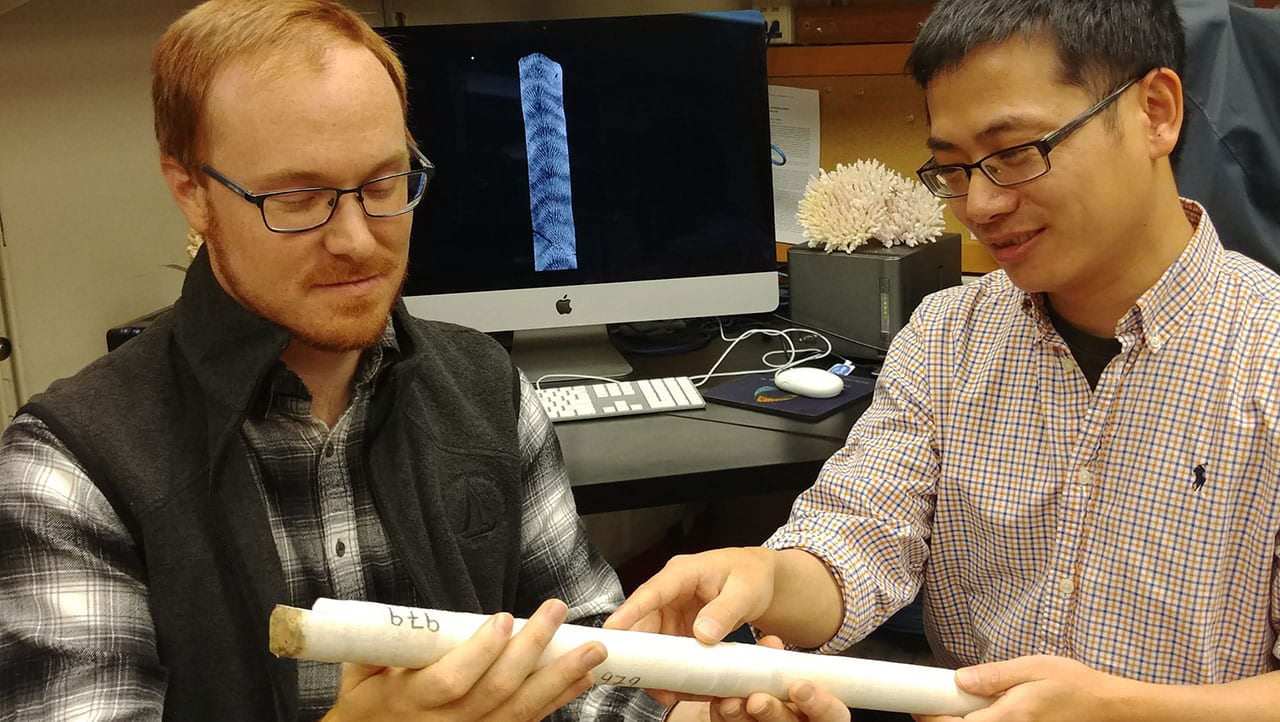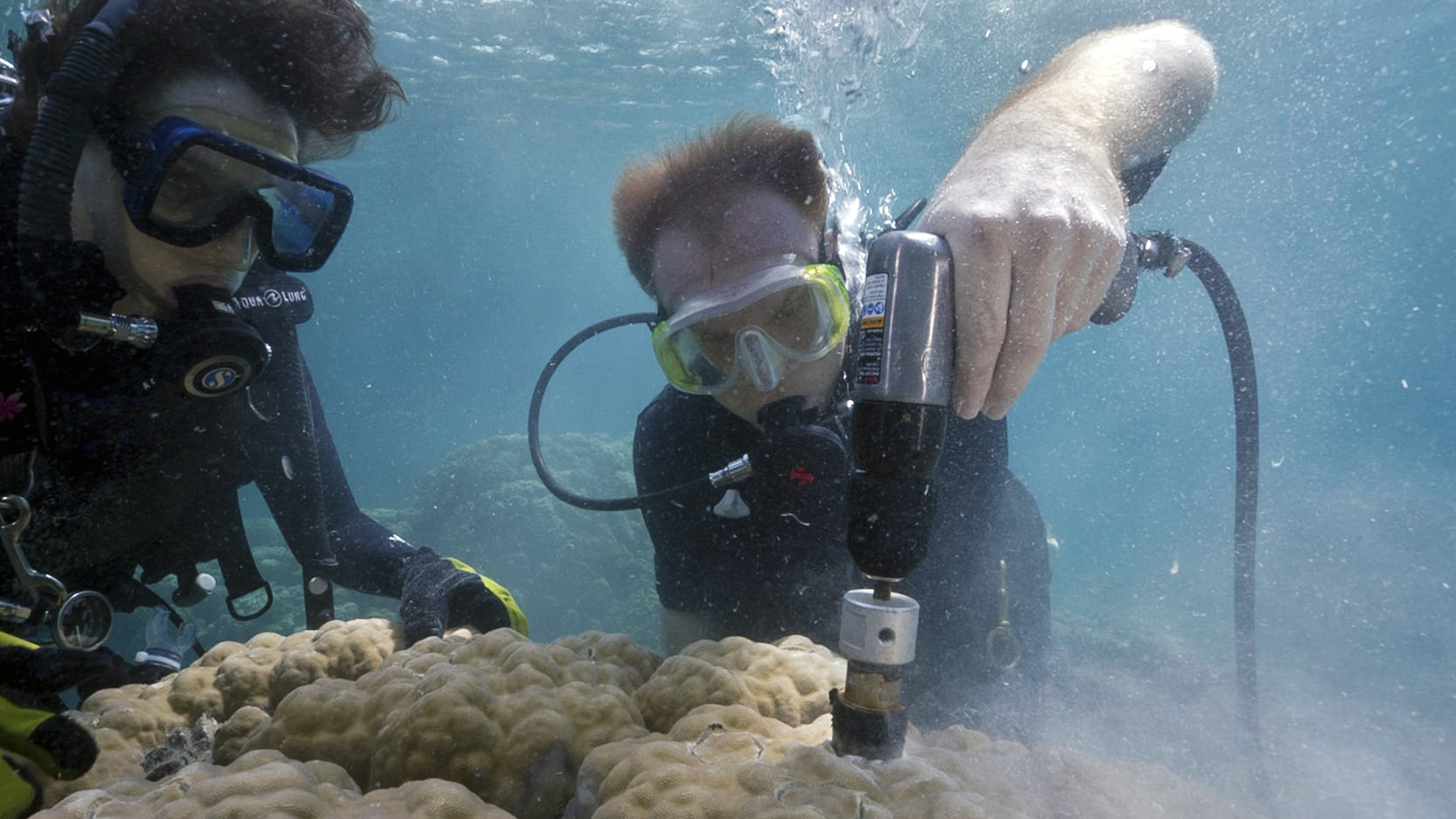27 August 2020

MIT-WHOI Joint Program student Nathaniel Mollica (left) and WHOI scientist Weifu Guo examine a core extracted from a coral skeleton.
Credit: Anne Cohen Lab, ©Woods Hole Oceanographic Institution
AGU press contact:
Liza Lester, +1 (202) 777-7396, [email protected]
Woods Hole Oceanographic Institution press contact:
Erin Koenig, +1 (508) 289-3340, [email protected]
Contact information for the researchers:
Weifu Guo [email protected] and Anne Cohen [email protected], Woods Hole Oceanographic Institution
WASHINGTON—Scientists have long suspected that ocean acidification is affecting corals’ ability to build their skeletons, but it has been challenging to isolate its effect from that of warming ocean temperatures, which also influence coral growth. New research published in AGU’s journal Geophysical Research Letters reveals the distinct impact that ocean acidification is having on coral growth on some of the world’s iconic reefs.
The new study found a significant reduction in the density of coral skeleton along much of the Great Barrier Reef, the world’s largest coral reef system, and on two reefs in the South China Sea, which they attribute largely to the increasing acidity of the waters surrounding these reefs since 1950. But coral reefs in marine protected areas of the remote central Pacific did not show effects of acidification.
“This is the first unambiguous detection and attribution of ocean acidification’s impact on coral growth,” said lead author Weifu Guo, a geologist at Woods Hole Oceanographic Institution. “Our study presents strong evidence that 20th century ocean acidification, exacerbated by reef biogeochemical processes, had measurable effects on the growth of a keystone reef-building coral species across the Great Barrier Reef and in the South China Sea. These effects will likely accelerate as ocean acidification progresses over the next several decades.”

WHOI scientist Anne Cohen (left) and MIT-WHOI Joint Program student Nathan Mollica extract core samples from a giant Porites coral in Risong Bay, Palau.
Credit: Richard Brooks, Lightning Strike Media Productions, Palau.
Roughly a third of global carbon dioxide emissions are absorbed by the ocean. The excess makes the water more acidic. Seawater pH around the globe has decreased on average by 0.1 on the pH scale since the pre-industrial era, equivalent to about a 30% increase in acidity. Such small-sounding changes in pH can have profound effects on biological processes, including the calcification of shells. Ocean acidification makes the carbonate ions need to build and maintain shells less available in seawater and can even dissolve shells.
Animals that rely on calcium carbonate to create their skeletons, such as corals, are at risk as ocean pH continues to decline. Ocean acidification targets the density of the skeleton, silently whittling away at the coral’s strength, much like osteoporosis weakens bones in humans.
“The corals aren’t able to tell us what they’re feeling, but we can see it in their skeletons,” said Anne Cohen, a WHOI scientist and co-author of the study. “The problem is that corals really need the strength they get from their density, because that’s what keeps reefs from breaking apart. The compounding effects of temperature, local stressors, and now ocean acidification will be devastating for many reefs.”
In their investigation, Guo and his co-authors examined published data collected from the skeletons of Porites corals—a long-living, dome-shaped species found across the Indo-Pacific—combined with new three-dimensional CT scan images of Porites from reefs in the central Pacific Ocean. Using these skeletal archives, which date back to 1871, 1901, and 1978, respectively, the researchers established the corals’ annual growth and density. They plugged this information, as well as historical temperature and seawater chemistry data from each reef, into a model to predict the corals’ response to constant and changing environmental conditions.
The authors found that ocean acidification caused a significant decline in Porites skeletal density in the Great Barrier Reef (13%) and the South China Sea (7%), starting around 1950. Conversely, they found no impact of ocean acidification on the same types of corals in the Phoenix Islands and central Pacific, where the protected reefs are not as impacted by pollution, overfishing, or runoff from land.
While carbon dioxide emissions are the largest driver of ocean acidification on a global scale, the authors point out that sewage and runoff from land can exacerbate the effect, causing even further reductions of seawater pH on nearby reefs. The authors attribute the declining skeletal density of corals on the Great Barrier Reef and South China Sea to the combined effects of ocean acidification and runoff. Conversely, reefs in marine protected areas of the central Pacific have so far been shielded from these impacts.
“This method really opens a new way to determine the impact of ocean acidification on reefs around the world,” said Guo. “Then we can focus on the reef systems where we can potentially mitigate the local impacts and protect the reef.”
Key Takeaways
- An innovative numerical model developed by researchers at the Woods Hole Oceanographic Institution demonstrates the distinct impact of ocean acidification—separate from ocean warming—on coral growth.
- The model shows that ocean acidification has caused a 13 percent decline in the skeletal density of Porites corals in the Great Barrier Reef, and a 7 percent decline in the South China Sea since 1950.
- Pollution and land runoff can exacerbate the effects of ocean acidification, causing corals in local reefs to weaken more quickly than those located farther away from human settlements.
- A global-scale investigation of coral CT scans could help to target protections for vulnerable reefs.
Funding for this research was provided by the National Science Foundation, the Robertson Foundation, the Atlantic Donor Advised Fund, and WHOI’s Investment in Science Fund.
###
AGU (www.agu.org) supports 130,000 enthusiasts to experts worldwide in Earth and space sciences. Through broad and inclusive partnerships, we advance discovery and solution science that accelerate knowledge and create solutions that are ethical, unbiased and respectful of communities and their values. Our programs include serving as a scholarly publisher, convening virtual and in-person events and providing career support. We live our values in everything we do, such as our net zero energy renovated building in Washington, D.C. and our Ethics and Equity Center, which fosters a diverse and inclusive geoscience community to ensure responsible conduct.
Notes for Journalists
This research study will be freely available until 30 September 2020. Download a PDF copy of the paper here. Neither the paper nor this press release is under embargo.
Paper title:
“Ocean Acidification has Impacted Coral Growth on the Great Barrier Reef”
Authors:
Weifu Guo and Anne L. Cohen, Department of Geology and Geophysics, Woods Hole Oceanographic Institution, Woods Hole, MA, USA
Rohit Bokade, Department of Mechanical and Industrial Engineering, Northeastern University, Boston, MA and Department of Geology and Geophysics, Woods Hole Oceanographic Institution, Woods Hole, MA, USA.
Nathaniel Mollica, Massachusetts Institute of Technology-Woods Hole Oceanographic Institution Joint Program in Oceanography, Woods Hole, MA, and Department of Geology and Geophysics, Woods Hole Oceanographic Institution, Woods Hole, MA, USA
Muriel Leung, Department of Physics and Astronomy, the University of Pennsylvania, Philadelphia, PA, USA and Department of Geology and Geophysics, Woods Hole Oceanographic Institution, Woods Hole, MA, USA
Russell Brainard, Pacific Islands Fisheries Science Center, National Oceanic and Atmospheric Administration, Honolulu, HI, USA. Present address: The Red Sea Development Company, Riyadh, Saudi Arabia.